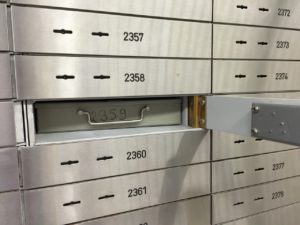So, you’ve executed a will.
Now, the question a significant number of my clients ask me: “What should I do with the original copy of my will?”
Where should I store my will?

Typically, my answer is to put it in a safe and easily accessible location. You should also inform the person you named as personal representative of its location.
But what about putting the will into your bank safety deposit box?
An advantage of a safety deposit box is that the likelihood of the will ever being lost is quite low. (This is certainly an appealing alternative to trying to admit a lost or stolen will to probate, which isn’t exactly the easiest process).
But while the appeal of preventing an original will from being lost is strong, using a safety deposit box to store your original will can cause significant problems.
Issues with accessing a bank safety deposit box
Let’s say you decided to put your will into a bank safety deposit box. If you haven’t named a co-owner of that box, the only person that can access it is you (or in certain circumstances, your agent under a durable power of attorney).
Your personal representative, named in the will, may attempt to access the box. Unfortunately, the bank will likely say it is inaccessible without an order appointing a personal representative and letters of administration.
Probate administration is the only way to obtain such an order and court-issued letters. Opening probate administration to probate a will requires, you guessed it, the original will.
In summary, you need the original will to open a probate to access the box, but you cannot get the original will to open the probate because it is in the safety deposit box.
It’s quite easy to see the conundrum created by storing your original will in a safety deposit box. Needless to say, if that’s something you’re going to do, it would be wise to ensure someone can gain access to it.